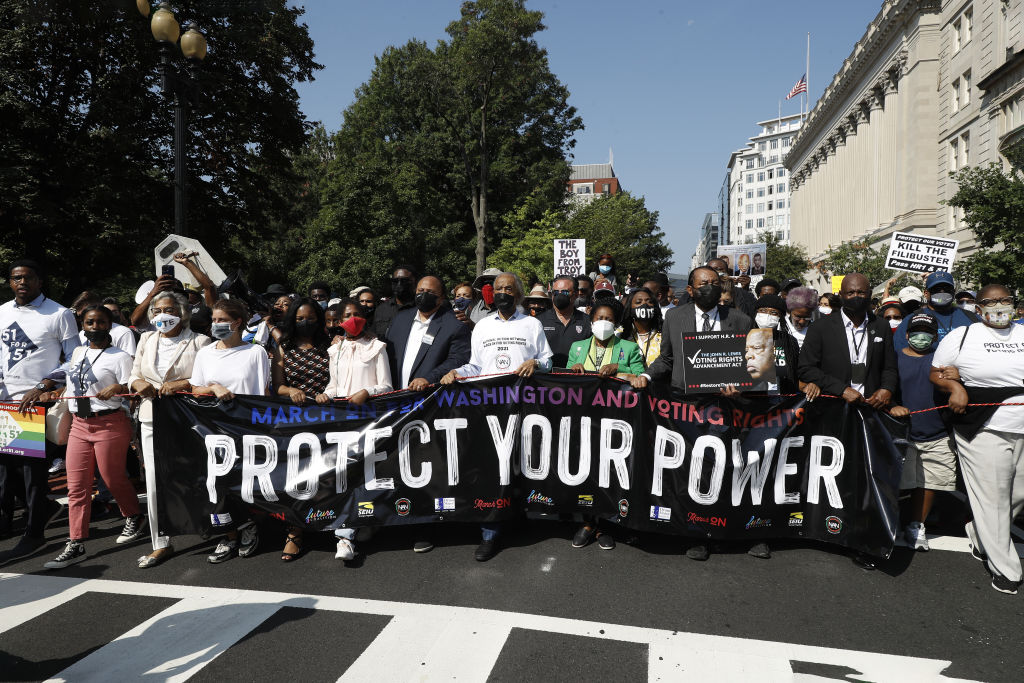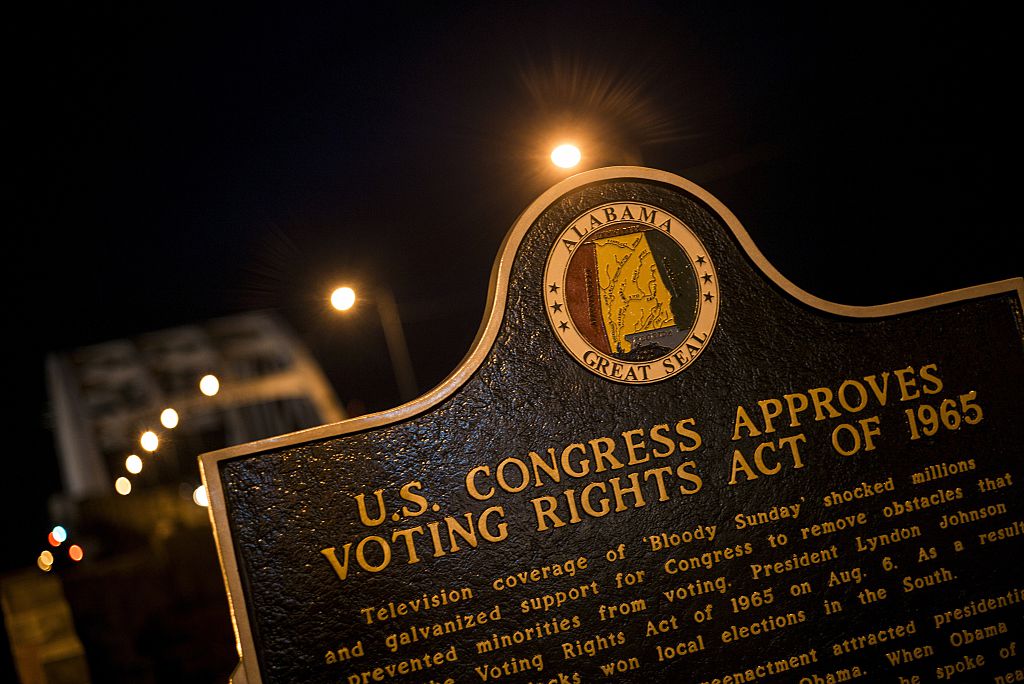
Martin Luther King III and other civil rights leaders march for voting rights in 2021 Source: Anadolu Agency / Getty
Seated in a hospital waiting room, with the buzz and flicker of dim lighting above me, was the pain of the unknown within me. On the other side of those doors, I awaited word on whether a close family member would be released—in life or in death.
Our bodies, like our democracy, houses the sum of everything that makes our nation what it is and what it is yet to be. And like our bodies, our democracy goes through changes, depending on where we are and when we exist within it.
Most importantly, the health and development of our democracy depend on who can vote. If you are in a southern state today, your interaction with our democracy may feel adolescent. It’s awkward. It’s attitude stinks. It makes a lot of mistakes. And it still has a lot of growing to do.
That’s because, on this 57th anniversary of the Voting Rights Act, so many of us—mostly Black or brown—cannot vote. The Voting Rights Act of 1965 was, and continues to be, our strongest means to vote. It was signed into law with the purpose of “enforc[ing] the fifteenth amendment to the Constitution”, because Black people—particularly those across segregated southern states—faced insurmountable barriers to voting. Racist, state sanctioned policies like literacy tests, grandfather clauses and poll taxes effectively prohibited most Black people from voting.
The Voting Rights Act, the crowning achievement of the civil rights movement, was signed into law #OTD in 1965.
We are sober-minded about the reality that the march toward equality continues. The recent assaults on voting rights are salient reminders of this. pic.twitter.com/bkKz6UtRya
— Legal Defense Fund (@NAACP_LDF) August 6, 2022
A pioneer among them, the state of Georgia was the first state to establish poll taxes. Georgia’s first poll tax was signed into law in 1871, and by 1888, the Black vote was cut in half.
The Voting Rights Act healed some of the biggest sicknesses of our democracy, but it certainly didn’t cure everything. Literacy tests, poll taxes, property tests, and other Jim Crow methods of torture were abolished, which had an immediate impact in Black communities.
Voter registration skyrocketed in Black communities, with 250,000 new Black voters registered in 1965. Participation increased too—by at least 50% across most of the southern states by 1966. In recent years, Black voter turnout surpassed white voter turnout—66.6% versus 64.1% in 2012.
Our democracy was getting healthier. But it still had more growing to do. Our right to vote is carved from Supreme Court precedent. We navigate the where, when, how and ifs of voting through the interpretation of the Voting Rights Act by the Supreme Court. We have the “fundamental right” to vote, which means the Supreme Court should be reluctant to make sweeping changes to our laws which could result in voter discrimination.
It’s the equivalent of putting a lockbox, inside of a safe, inside of a bigger safe. You’d have to go through a lot to get through the first two safes (say, state legislation and state court proceedings), but once you’re close, there’s nothing stopping you from getting inside the lockbox. Alas, with the 2013 Shelby v. Holder decision, our outer safes got cracked and our democracy is exposed. Again. That decision weakened the Voting Rights Act by removing the preclearance requirement of Section 5.
Section 5 required states with a history of insidious discrimination to “preclear” or get permission from the Department of Justice before making any rash decisions that could cause harm or discrimination against Black people when attempting to vote. The harm and discrimination looked like poll taxes and literacy tests in the 1960s. After Shelby v. Holder it looked like discriminatory voter ID laws, felon disenfranchisement, and removing voting sites in Black communities because all of these tactics led to lower turnout in Black communities.
Then, in 2021, the Supreme Court in Brnovich v. DNC made it more difficult to challenge discriminatory voting laws. We are officially in a Constitutional crisis, and the fate of our democracy is at stake.
It has taken us decades to go from literacy tests to mobile voting, but we cannot continue the trend of closing polling sites, prohibiting Sunday voting and criminalizing passing out water. We can improve the health of our democracy.
Our vote determines the fate of legislation in your state and across the nation. You also choose the judge that presides over voting rights cases, criminal cases, and civil rights cases. Your vote protects the interests of your neighbors, your families and the promise of a healthier democracy.
Aklima Khondoker is a Atlanta-based civil rights attorney and voting rights advocate.
SEE ALSO:
It’s Been 57 Years Since The Voting Rights Act Passed And Democracy Is Still On The Ballot
OP-ED: Voting Rights Fight Requires Trust In The Process Of Progress
window.addEventListener(‘interaction’, function () {
setTimeout(function () {
var s = document.createElement(‘script’), el = document.getElementsByTagName(‘script’)[ 0 ];
s.async = true;
s.src = ‘https://platform.twitter.com/widgets.js’;
el.parentNode.insertBefore(s, el);
}, 1000)
});
The post OP-ED: Healing Democracy Requires Everyone To Show Up No Matter The Odds appeared first on NewsOne.

